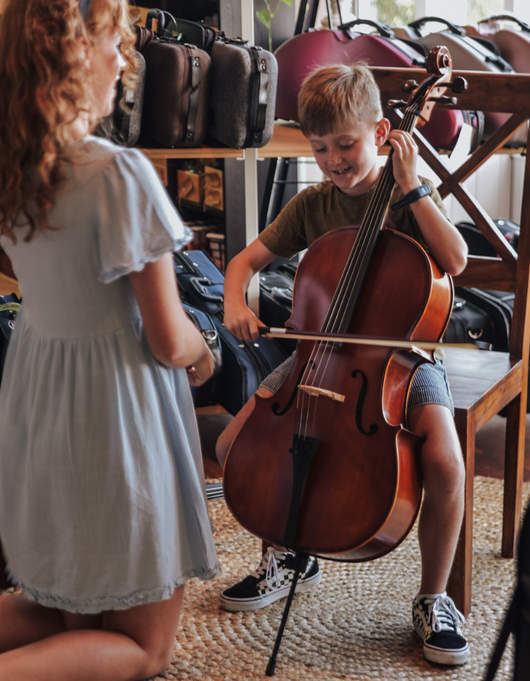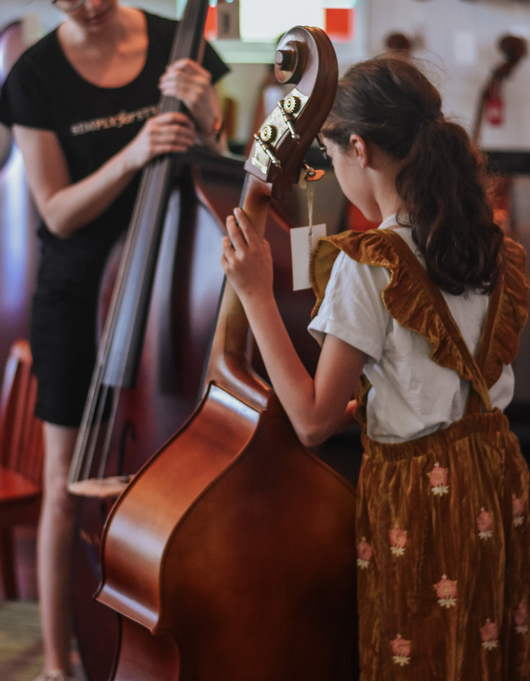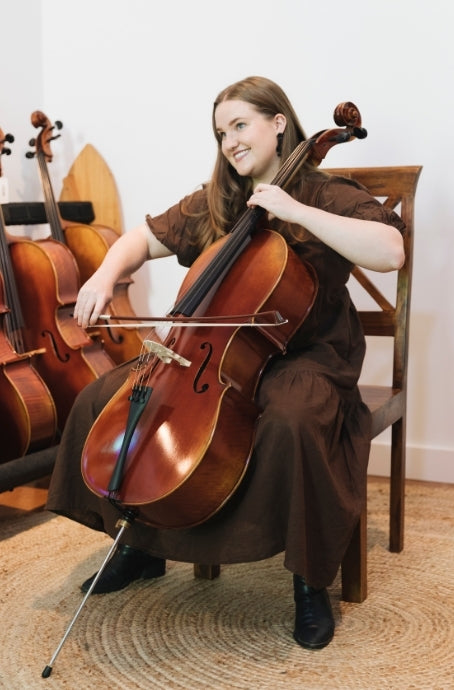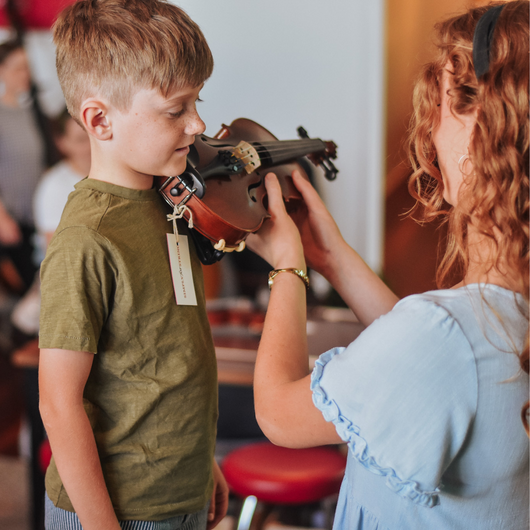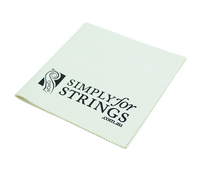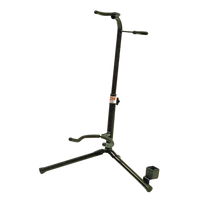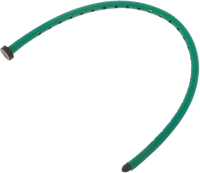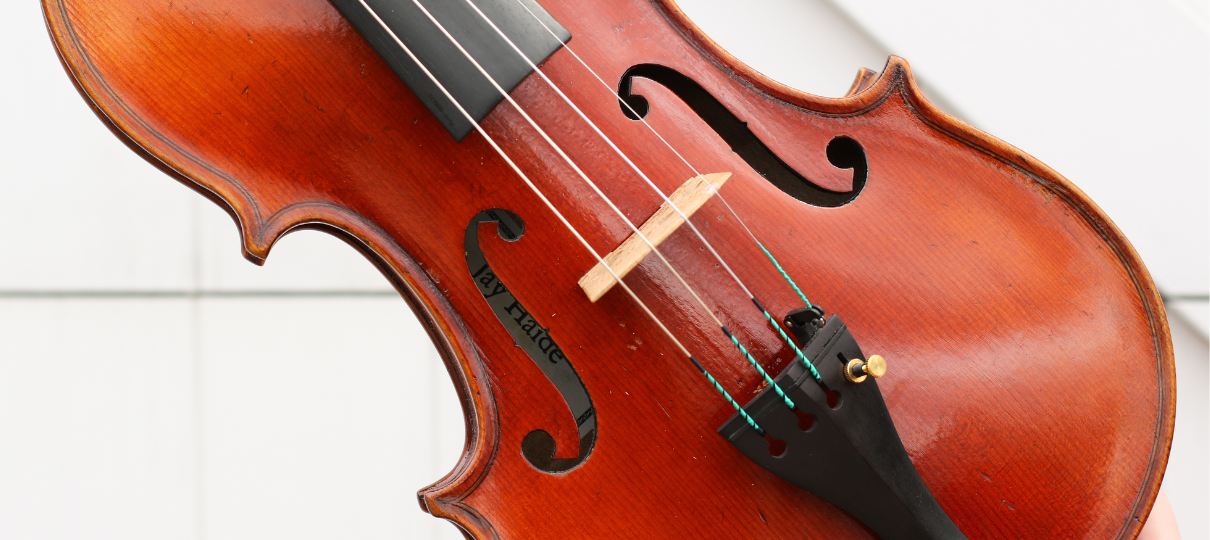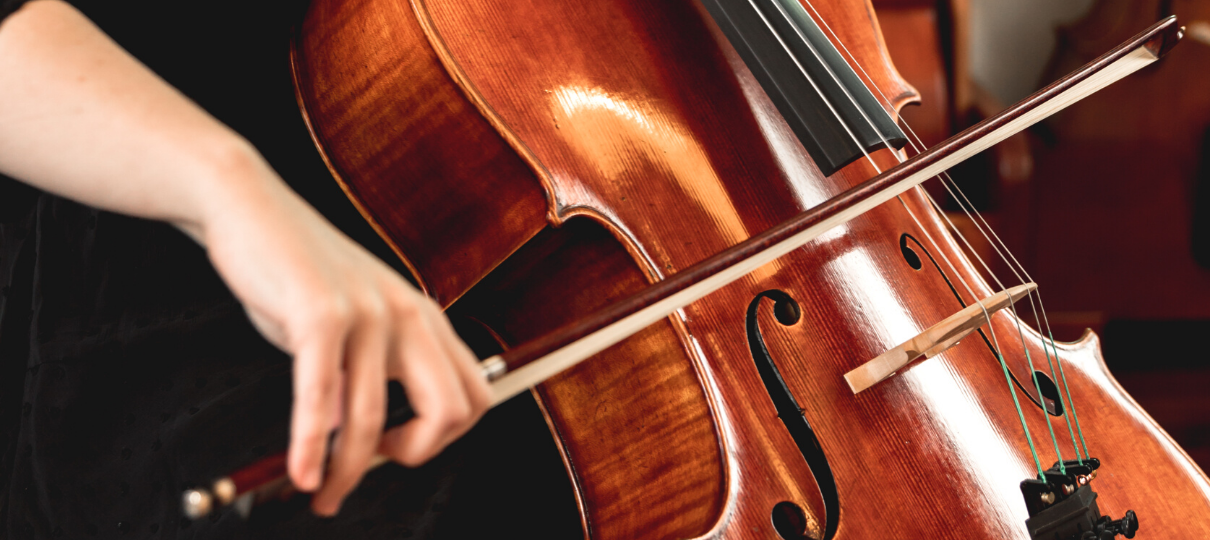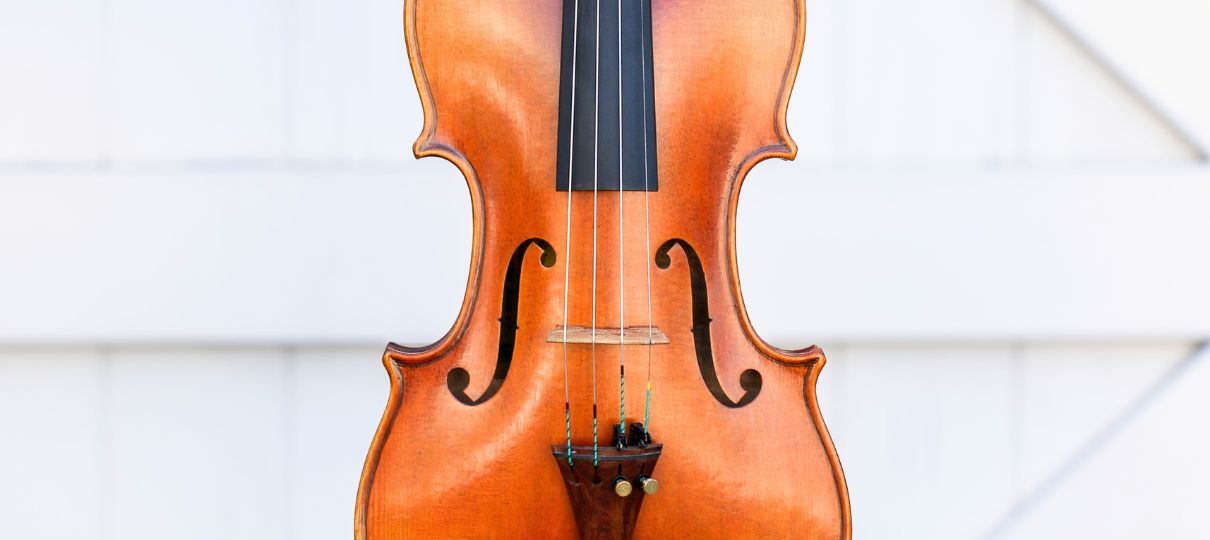Get the most from your string instrument with our simple care guide.
The following information is offered in the interests of prolonging the useful life of your string instrument, specifically your violin, viola, cello or double bass. With just a little thoughtfulness and care, you can achieve many years of drama-free partnership with your instrument, preserve its structural integrity, improve its tonal character and reproduction and protect your investment.
Shop instrument care and maintenance tools here.
How To: Cleaning Your Instrument
- After each practice session, don't forget to wipe down your strings! It is important to wipe down the strings of your violin after each playing session because rosin can quickly build up and affect the sound of your instrument. This is an easy step that should become a regular habit after practicing. Using a soft, dry, clean microfibre cloth, gently wipe the rosin off each individual string, moving up and down each string in a sliding motion. Be sure to wipe off any rosin flakes that might break off onto the instrument with your cloth during this step. Be careful to not press down on the strings too hard, otherwise you could cause them to fall out of tune.
- If there is a build-up of rosin on your strings that you cannot wipe off, you can use pure alcohol or a special string cleaner to remove this. Put a few drops of alcohol on the cloth and rub on the strings, but be careful to ensure that the alcohol does not touch any other part of the violin as alcohol will damage the varnish.
- Wipe down your bow - like your strings, the rosin can build up and affect the longetivity of your bow. Using a soft, dry, clean microfibre cloth as often as you can remember can help your bow last.
- Use a soft, dry, clean microfibre cloth to wipe down the scroll, neck, face and body of your instrument. The more frequently you do this, the better! We recommend getting into a regular cleaning session flow (perhaps every Saturday or Sunday) to prevent rosin and germs from building up on your instrument. If you do have a lot of rosin buildup on your instrument, we recommend investing in some specialised string instrument cleaning solutions in order to take great care of your instrument and it's varnish.
- You can use a specialised string instrument polish, like Viol, once a month or when you have an important performance to give your instrument some extra shine.
- When wiping down the face of your instrument, take care around the F-holes and bridge. The woodwork of both the bridge and F-holes is very delicate, so take care to ensure the cleaning cloth doesn't get caught. You can wipe any rosin dust off your bridge gently to help prevent a muffled sound.
- Apply the specialised string instrument cleaning solutions to another clean cloth, rather than directly onto the instrument. For a violin or viola, you'll only need a very small dab of product in order to fully clean your instrument. Keep the cleaning solutions to the face and back of the instrument to avoid any oils building up over time.
- Don't forget to clean your chinrest and tailpiece to keep them spick and span! A quick wipe over with your cloth will do the trick.
- If you're having troubles adjusting your pegs, apply a thin coat of peg paste to the pegs every couple of months.
Make sure when you are cleaning your instrument that you get the right type of polish. Never, ever use a furniture or timber polish from a hardware store or similar. Only use a dry cloth on your instrument if you are not using a specialised string instrument polish - instruments don't react well to water!
Don't forget to occasionally clean out your case. Though people often forget about this step, your instrument will not stay clean if its storage isn't clean. Empty and vacuum out your case once a week or once you start seeing flakes of dust, dirt, and rosin. This step has the added benefit of preventing dust mites that may eat your instrument's bow hair.
We hope you find these cleaning tips helpful. If you're nervous about performing a general service on your instrument, why not have a professional do it? Book an appointment with our luthiers at Red Hill today.
There are numerous other factors which can affect the wellbeing of your instrument. Here are just some, offered to stimulate your own thinking and research.
Heat
Time and time again we see instruments which have suffered ‘heat stress’, i.e. they have been left in a storage facility where the temperature has been allowed to climb beyond acceptable limits. Maybe you left it in the car all day in readiness for the afternoon’s lesson or performance or placed it in a bag rack at school which is in direct sunshine. Perhaps you decided to catch up on some exercise and walk home from school or work. Even an hour or two in the car in the car while you shop is dangerous. Our message is clear, your instrument is in grave danger. Think about it this way, ‘if you’re hot, it’s hotter!' At least you can have a cold drink!
So, what to do about this? Your instrument should, wherever practical, only be used in a temperature range of 24-28 degrees Celsius. Higher or lower temps can cause the materials from which it’s made to dry out and shrink, effecting seams and joints. Cracks can appear where no other damage is evident and no trauma was suffered.
The tonal reproduction can be harmed as the plates [top and back] take on greater tension caused by shrinkage. Its sound could become introverted and indistinct with some previously defining aspects of its voice now laboured and more difficult to achieve.
Always store your instrument in its case in a cool, dry, temperature consistent place, lid down, latches engaged. This will afford some insulation against fluctuations in temperature.
Humidity
The second greatest danger is moisture. Your instrument can and will absorb moisture from its environment to its great detriment. Orchestral stringed instruments are finished [varnish or lacquer] on the outside only. The interior, the part you can’t see, is in its natural state, unprotected by bark or sapwood, and therefore capable of absorbing or shedding moisture. We strongly advise you monitor the humidity where you store your instrument and if necessary take steps to add or subtract moisture so as to achieve a 45%-55% range.
‘In-case humidifiers’ are cheap and effective. Many homes where young children reside will already have steam humidifiers. These can be used to good effect during peak periods but caution is advised. The use of an accurate electronic monitor is helpful. Alternatively, a case mounted Hygrometer is available.
Orchestral stringed instruments are assembled with water-soluble glues. With too much humidity, the glue joints soften, seams open and the structural integrity of the instrument is compromised. Fingerboards fall off, neck joints loosen due to the effects of string tension and so on.
Tone can be badly affected by humidity. As plates swell, they become sluggish and less responsive. The tone and active participation you are used to can vanish, replace by uninspiring, barely adequate noise. One author called it ‘tonal apathy’.
All this can happen to relatively new instruments and is not covered by warranty. As custodian, it is your responsibility to educate yourself and take appropriate measures to ensure the wellbeing of your instrument.
High-Risk Behaviour
Your stringed instrument is most at risk from you! Thoughtless or careless treatment is the most detrimental. Young inexperienced players are more at fault here, relying too heavily on the impact absorbing capabilities of cases, overconfidence in the integrity of handles and straps, and a misguided belief in the capacity of their instrument to endure impacts and injury. The best defence is education and developing good handling habits. Here are some ideas...
- If it’s not in your hands, it’s in its case meaning– bow loosened – lid down – latches engaged – against the wall – out of harm’s way. [younger siblings, boisterous play, unrelated activities].
- Never on the floor. If you don’t stand on it, someone else will. [cellos and basses excepted. Store these against a wall, endpin in, bridge facing the wall].
- Used only for their intended purpose. It’s not a doorstop or paperweight, it’s not a weapon.
- Don’t overtighten. Strings will break, bows will break, components will wear prematurely.
Your Instrument At Its Best
Here are a few helpful hints on how to get the very best from your musical partner, in addition to the ideas above.
- Wipe rosin residue from your instrument with a soft dry cloth after every use. Rosin can absorb moisture causing it to adhere to varnish. Removing this is problematic and time-consuming. The use of a properly formulated cleaner is advised to preserve the varnish surface and sheen.
- Remove rosin from strings using a rosin cleaner fluid. Done reasonably regularly, this can prolong string and bow hair life.
- String sets should be replaced at least twice per year, allowing regular practice and performance habits. Replacing strings as they break is a false economy as this only indicates the other strings are equally as fatigued and should be retired. We also advise you to carry a spare string set, just in case.
- Use only quality strings and accessories. Synthetic core strings will produce a warmer richer tone, be softer to the touch, and promote a more sensitive playing style. Each instrument has a unique and special voice. Be sure to use strings which compliment it’s voice or enable you to bring it out the best way. An instrument with a mature relaxed voice may do well with a medium tension synthetic core string while a newer developing instrument may need a slightly heavier tension set enabling you to work a little harder with the bow.
- Ensure you use a rosin which is compatible with your string of choice. A light coloured rosin is best for steel strings while the darker rosins are best for synthetic cored strings.
- Bow hair should be loosened after every use and never overtightened. Hair and stick life can be extended with this deliberate treatment. To prevent infestation by Dermestids [bow hair beetle], regularly vacuum the case, add cedar chips or mothballs [wrapped in cloth], leave the case open in sunlight [minus instrument] for a few days at a time two or three times a year. The application of insecticide is not recommended as spray residues may harm instrument varnish.
Finally…We hope you find these suggestions helpful. With a little thought and care, your precious performance partner will live to delight the generations to come and cost you less stress and cash. If you start to notice changes in the sound of your instrument or even cracks, it’s time to bring your instrument in for a professional checkup. Good luck and keep making beautiful music!
Are you a pianist or guitarist? Visit this blog post to learn some great maintenance tips for other musical instruments.
Shop instrument care and maintenance tools here.





